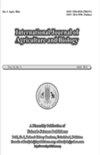Co-Application of Farmyard Manure and Gypsum Improves Yield and Quality of Peanut (Arachis hypogaea) under Rainfed Conditions
Q2 Agricultural and Biological Sciences
引用次数: 3
Abstract
Peanut (Arachis hypogaea L.) is the common cash crop of the rainfed areas. Appropriate management practices are very important to get better yield of peanut in sandy loam soil. A field study was carried out during the growing seasons of 2018 and 2019 to evaluate the effect of poultry manure (PM) (37.1 t ha-1), farmyard manure (FYM) (49.4 t ha-1), gypsum (GYP) (2.5 t ha-1), liquid humic acid (HA) (49.4 L ha-1) and co-application of GYP (1.2 t ha-1) and FYM (24.7 t ha-1) on peanut yield, quality and soil physical properties. Application of FYM, PM, HA and GYP (alone or in combination) significantly improved peanut yield, quality and soil physical properties. The combined application of GYP and FYM proved most effective (P ≤ 0.05) in improving the peanut yield (no. of pods per plant, 100 seed weight etc), quality (crude protein and oil content) and soil physical properties (moisture percentage, infiltration rate and bulk density). The combined application of GYP and FYM increased the pods yield by 67 and 65% during 2018 and 2019, respectively than control. Crude proteins (21%) and oil contents (9.0%) were also substantially increased in the combined application. Moreover, the combined application of GYP and FYM significantly retained the soil moisture and reduced bulk density of soil. Present findings suggest that integrated use of FYM and GYP under field conditions could improve the crop productivity, crude protein, oil contents, moisture percentage, and reduce the bulk density of soil thus improving overall soil health. © 2021 Friends Science Publishers旱作条件下农家肥与石膏配施可提高花生产量和品质
花生是热带雨林地区常见的经济作物。适宜的管理措施对提高沙壤土花生产量具有重要意义。在2018年和2019年的生长季节进行了一项实地研究,以评估家禽粪便(PM)(37.1 t ha-1)、农家肥(FYM)(49.4 t ha-1。FYM、PM、HA和GYP(单独或联合应用)显著提高了花生产量、品质和土壤物理性质。GYP和FYM联合应用对提高花生产量(单株荚数、百粒重等)、品质(粗蛋白和含油量)和土壤物理性质(含水率、入渗率和容重)最为有效(P≤0.05)。在2018年和2019年,GYP和FYM的联合应用使荚产量分别比对照增加了67%和65%。粗蛋白质(21%)和油含量(9.0%)在联合应用中也显著增加。此外,GYP和FYM的联合施用显著保持了土壤水分,降低了土壤容重。目前的研究结果表明,在田间条件下综合使用FYM和GYP可以提高作物生产力、粗蛋白、含油量、水分百分比,并降低土壤容重,从而改善土壤整体健康。©2021 Friends Science出版社
本文章由计算机程序翻译,如有差异,请以英文原文为准。
求助全文
约1分钟内获得全文
求助全文
来源期刊

International Journal of Agriculture and Biology
AGRICULTURE, MULTIDISCIPLINARY-
CiteScore
1.70
自引率
0.00%
发文量
40
审稿时长
5 months
期刊介绍:
Information not localized
 求助内容:
求助内容: 应助结果提醒方式:
应助结果提醒方式:


